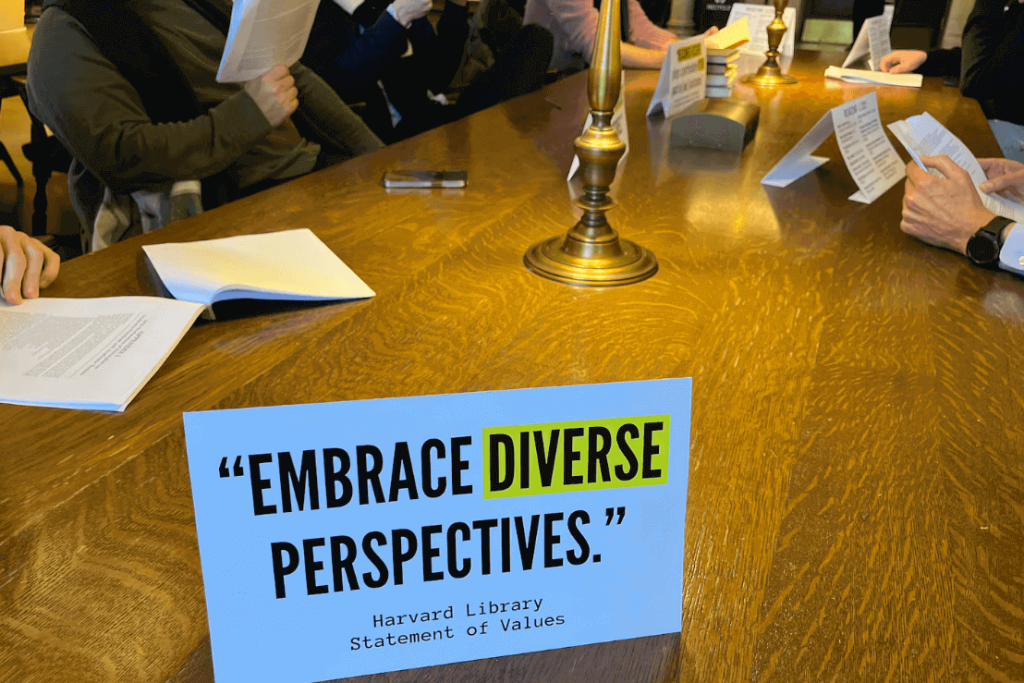【中美创新时报2024 年 10 月 25 日编译讯】(记者温友平编译)二十多名哈佛大学教职员工被停职,一周前他们举行示威活动,批评学院因举行非暴力抗议活动而禁止 12 多名亲巴勒斯坦学生进入怀德纳图书馆。《波士顿环球报》记者Tonya Alanez 对此作了下述报道。
据《哈佛深红报》周四报道,大约 25 名教职员工通过电子邮件收到通知,他们被禁止进入怀德纳图书馆两周。
这些教职员工现在面临着与他们所支持的学生同样的惩罚。对抗议活动的教职员工进行处罚似乎是哈佛大学前所未有的举动。据《深红报》报道,传统上,学术不端行为或性骚扰行为会导致常春藤盟校受到纪律处分。
哈佛大学“走出被占领的巴勒斯坦”组织周四发表声明称,上周在朗德尔图书馆举行了一次自习的 60 多名哈佛法学院学生也被剥夺了图书馆使用权。
该组织表示,作为回应,周四中午,约有 50 名学生、教师和工作人员举行了另一次自习。
周四被停课的三年级法学院学生霍尔登·霍普金斯告诉该组织,“种族灭绝大院的恐怖每天都在发生”,但“哈佛大学仍然坚持同谋”。
“对我来说,这次自习代表了我们反对这种同谋和恐怖的集体声音,”霍普金斯告诉哈佛大学“走出被占领的巴勒斯坦”。
哈佛图书馆的一位发言人拒绝对停课事件发表评论。这位发言人在周四的一封电子邮件中表示:“我们不对与图书馆事务或特权相关的个人事务发表评论。”
这位发言人反而引用了哈佛图书馆馆长玛莎·怀特黑德周四发表的一篇文章。
“一群人举着标语把阅览室从一个个人学习和反思的地方变成了一个公开声明的论坛,”怀特黑德写道。
怀特黑德继续说:“如果我们的图书馆空间成为抗议和示威的空间——无论是安静的还是其他的,也无论传达什么信息——它们都将偏离其作为学习和研究场所的重要作用。”
10 月 16 日,来自不同部门的约 30 名教授聚集在怀德纳大学,抗议该学院禁止 12 名以上学生因举行非暴力抗议而进入大楼两周的决定,他们聚集在洛克阅览室进行了长达一小时的静默“自习”。
这次示威活动谴责了教授们所说的大学限制言论自由的政策,他们认为这些政策对表达与加沙冲突有关的政治观点的学生产生了不成比例的影响。
他们表达了对上个月参加类似示威活动的哈佛学生群体的支持。学生们在图书馆举行了一场几乎无声的抗议,反对以色列在加沙地带和黎巴嫩的军事行动。
9 月 21 日,学生们戴着象征亲巴勒斯坦支持的头巾进入图书馆的自习室,并设置了笔记本电脑,上面写着“想象一下这件事发生在这里。” 之后,哈佛管理人员给学生们发了一封电子邮件,称他们的行为违反了全校《权利和责任声明》中规定的有关图书馆使用的规则和规定。
12 名学生被禁止进入怀德纳图书馆大楼两周。他们的图书馆特权和使用校园其他图书馆设施的权利没有被取消。他们保留了访问在线资料和借阅特权,并能够在校园内的其他图书馆取阅资料。
图书馆抗议活动是哈佛大学在夏季颁布的一套新规则或新实施规则的首次测试之一。
这些规定是哈佛大学为避免以色列和哈马斯战争带来的混乱而采取的措施之一。这场战争扰乱了上个学年的大部分时间,并导致哈佛校园内发生了长达数周的抗议活动。这些规定引发了关于大学应该在多大程度上规范政治表达的争论,一些教职员工谴责新规定是对抗议活动的过度打压,而另一些人则认为,管理人员应该规范示威活动的时间、方式和地点。
题图:10 月 16 日,来自不同部门的 30 名哈佛大学教授聚集在怀德纳图书馆举行示威活动,批评学院因举行非暴力抗议活动而禁止 12 多名学生进入图书馆两周。
附原英文报道:
Two dozen Harvard faculty suspended from library after pro-Palestinian protest
By Tonya Alanez Globe Staff,Updated October 24, 2024
Thirty Harvard University professors from different departments gathered at Widener library on Oct. 16 for a demonstration criticizing the college’s decision to ban over 12 students from the building for two weeks for holding a nonviolent protest.
Two dozen Harvard faculty members have been suspended from the main library on campus, a week after they staged a demonstration criticizing the college’s decision to ban over 12 pro-Palestinian students from the Widener library for holding a nonviolent protest.
About 25 faculty members were notified by email that they are suspended from entering the Widener library for two weeks, The Harvard Crimson reported Thursday.
The faculty are now facing the same discipline as the students they were taking a stand for. Disciplining faculty for protest appears to be an unprecedented move at Harvard. Traditionally, academic misconduct or sexual harassment violations drive discipline at the Ivy League school, the Crimson reported.
Harvard Out of Occupied Palestine issued a statement Thursday, saying that more than 60 Harvard law students who held a study-in last week at Langdell Library had also lost library privileges.
In response, about 50 students, faculty and staff held another study-in at noon Thursday, the organization said.
Holden Hopkins, a third-year law student who received a library suspension on Thursday, told the organization that “the horrors of the genocide compound daily,” yet “Harvard persists in its complicity.”
“For me, this study-in represents our collective voice in pushing against such complicity and horror,” Hopkins told Harvard Out of Occupied Palestine.
A spokesperson for Harvard Libraries declined to comment on the suspensions. “We do not comment on individual matters related to library matters or privileges,” the spokesperson said in an email Thursday.
The spokesperson instead referenced an essay published Thursday by Martha Whitehead who is head of Harvard Libraries.
“An assembly of people displaying signs changes a reading room from a place for individual learning and reflection to a forum for public statements,” Whitehead wrote.
Whitehead continued: “If our library spaces become a space for protest and demonstration — quiet or otherwise, and no matter the message — they will be diverted from their vital role as places for learning and research.”
When about 30 professors from different departments gathered at Widener on Oct. 16 to demonstrate against the college’s decision to ban over 12 students from the building for two weeks for holding a nonviolent protest, they gathered in the Loker Reading Room for an hour-long silent “study-in.”
The demonstration denounced what the professors called the university’s restrictive free speech policies, which they argued disproportionately impacted students expressing political views related to the Gaza conflict.
They were expressing solidarity with the group of Harvard students who participated in a similar demonstration last month. The students held a largely silent protest in the library that objected to Israel’s military actions in the Gaza Strip and Lebanon.
On Sept. 21, students entered the library’s study hall wearing keffiyehs, a scarf symbolizing pro-Palestinian support, and set up laptops with notes reading “Imagine it happened here.” Afterward, Harvard administrators emailed the students saying their actions violated the rules and regulations regarding library use as specified in the university-wide Statement on Rights and Responsibilities.
Twelve students were suspended from accessing the Widener Library building for two weeks. Their library privileges and access to other campus library facilities were not revoked. They retained access to online materials and borrowing privileges, and were able to pick up materials at other libraries on campus.
The library protests are among the first tests of a set of new, or newly enforced, rules that Harvard promulgated during the summer.
The rules were part of the university’s effort to avoid the turmoil over the Israel-Hamas war that disrupted much of the last academic year and culminated in a weeks-long encampment in Harvard Yard. They sparked debate about the extent to which the university should regulate political expression, with some faculty members decrying the new rules as an excessive crackdown on protest activity and others arguing that it is appropriate for administrators to regulate the time, manner, and location of demonstrations.
